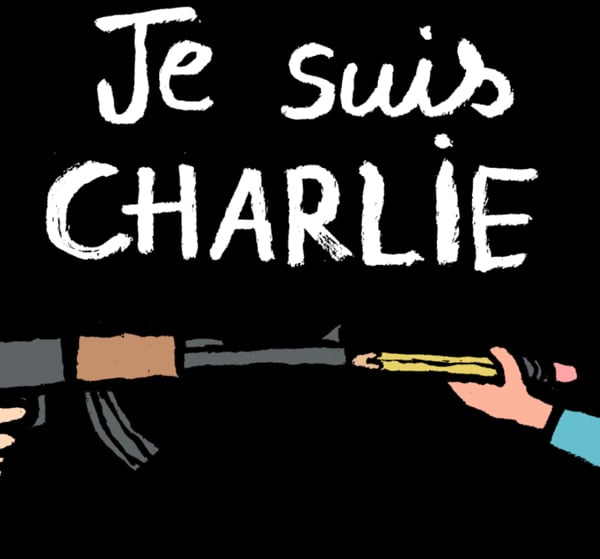
Photo: Jean Julien via Twitter, @jean_julien.
In a country where money is often a taboo subject, the French satirical weekly Charlie Hebdo finds itself flush seven months after Islamic radicals slaughtered its staff, according to Roger Cohen, writing in this month’s Vanity Fair.
“The post-massacre edition, No. 1178, sold some eight million copies, an increase of more than 13,000 percent over previous levels,” Cohen writes. “Subscriptions have soared to more than 200,000 from about 10,000.”
The slaughter was inspired by the paper’s charged subject matter. Charlie Hebdo had reproduced Danish cartoons that mocked the prophet Muhammad, and aimed many pages to lampooning Islamic radicals. While the paper held itself up as an equal-opportunity offender, critics argue that editors and cartoonists were attacking a persecuted minority in France. “It is not always easy to see the difference between a certain witty dissent from religion and a bullyingly racist agenda, but it is necessary to try,” Teju Cole writes in the New Yorker.
Laurent Sourisseau.
The influx of cash has resulted in the magazine’s assets rising as high as $33 million, says Cohen, though the owners dispute that figure, placing it at about $18 million.
Ownership of the paper is now consolidated with just a few shareholders: the parents of the late editorial director/cartoonist, Stéphane Charbonnier, aka Charb, now hold 40 percent ownership, with writer and cartoonist Laurent Sourisseau, also known as Riss, controlling 40 percent.
“We refuse that a handful of individuals take control, either total or partial, in absolute contempt for those who make and support” Charlie Hebdo, write staffers in a statement published in Le Monde. The signatories pose a challenging question: “How are we to escape the poison of the millions that, through exceptional sales and also donations and subscriptions, have fallen into the pockets of Charlie?”
“It’s not only fundamentalist that kills people,” Rénaud Luzier, a Hebdo cartoonist known as Luz, told Vice. “It’s money that kills people.”
Staffers maintain that only a more collective system of ownership can ensure the paper’s future.